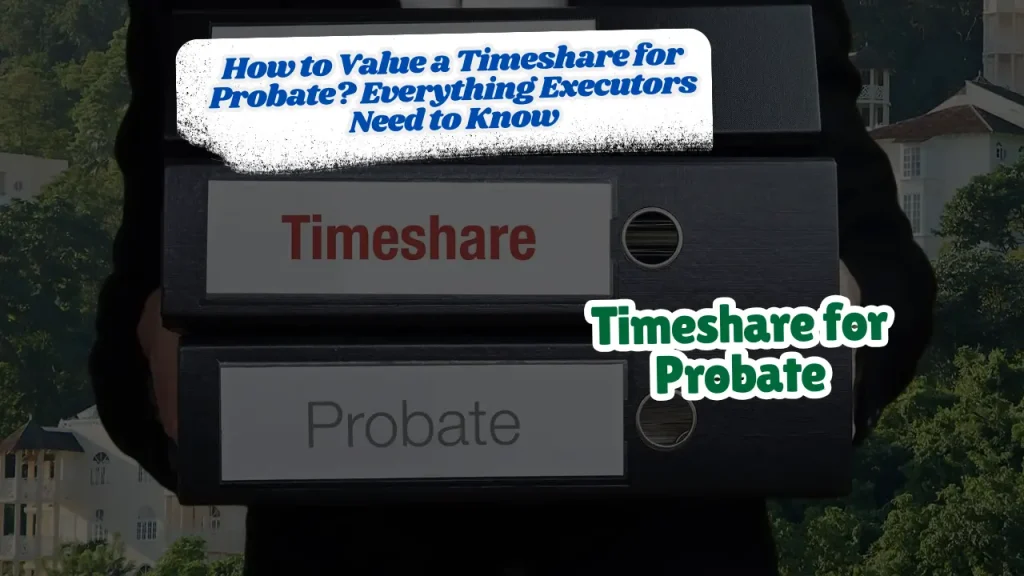How to Value a Timeshare for Probate? Everything Executors Need to Know
Valuing a timeshare for probate requires careful consideration of its unique characteristics, market dynamics, and legal obligations. Below is a structured approach to determine its fair market value and address key challenges:
Table of Contents
1. Understand the Timeshare Structure
- Deeded vs. Right-to-Use:
- Deeded Timeshares: Ownership of a specific unit/week, which can be inherited. Typically holds more value due to transferability.
- Right-to-Use: Grants usage rights for a fixed term (e.g., 20 years). Value diminishes as the expiration date approaches.
- Points-Based Systems: Value depends on the number of points and their flexibility within the resort network (e.g., Marriott Vacation Club).
2. Assess Market Demand and Liquidity
- Resale Market Challenges:
- Timeshares often sell below original purchase price due to oversupply and high maintenance fees.
- Platforms like RedWeek, eBay, or TUG (Timeshare Users Group) provide insight into resale prices.
- Resort Restrictions: Some resorts impose transfer fees or right-of-first-refusal clauses, limiting resale options.
3. Calculate Fair Market Value (FMV)
- IRS Guidelines: FMV is the price a willing buyer and seller would agree to, absent duress.
- Methods:
- Comparable Sales: Review recent sales of similar timeshares in the same resort/season.
- Professional Appraisal: Hire a certified appraiser specializing in timeshares (look for credentials from ASA or NAIFA).
- Resort Buy-Back Offers: Some resorts offer to repurchase at a discounted rate.
4. Factor in Ongoing Costs
- Maintenance Fees: Annual fees (often $1,000+) reduce net value. These must be paid until the timeshare is sold or transferred.
- Special Assessments: Unexpected fees for resort repairs/upgrades.
- Taxes and Insurance: Include property taxes and insurance premiums if applicable.
5. Evaluate Contractual Obligations
- Transferability: Check if the contract allows inheritance or requires resort approval for transfers.
- Exit Clauses: Some companies offer surrender programs (e.g., Wyndham, Hilton) to relinquish ownership, often at minimal/no cost.
Related article for you:
Does a Joint Account Avoid Probate? Rules, Risks & Alternatives

6. Consider Liability Scenarios
- Negative Value: If maintenance fees exceed resale value, the timeshare may be a liability. Heirs can disclaim ownership via a Qualified Disclaimer (IRS Section 2518).
- Abandonment Risks: Defaulting on fees can harm the estate’s credit; work with the resort to formalize surrender.
7. Address Legal and Tax Implications
- Probate Costs: Include appraisal fees, legal transfer costs, and potential court filings.
- Capital Gains/Losses:
- Gains: Taxed if sold above original purchase price (basis).
- Losses: May offset other estate income (consult a tax advisor).
8. Communicate with Heirs
- Manage Expectations: Emphasize FMV over sentimental value.
- Options for Heirs:
- Retain and use the timeshare (assuming ongoing costs).
- Sell on the secondary market.
- Surrender to the resort (if permitted).
Step-by-Step Valuation Process
- Gather Documents: Ownership contract, maintenance fee history, and resort contact info.
- Research Resale Listings: Use platforms like RedWeek or consult a timeshare resale broker.
- Obtain an Appraisal: Secure a certified valuation for probate compliance.
- Calculate Net Value: Subtract transfer fees, taxes, and outstanding obligations from FMV.
- File with the Court: Submit the appraisal as part of the probate inventory.
Challenges in Valuing a Timeshare
Timeshares differ from traditional real estate in several ways, making their valuation more complex:
- Fractional ownership: Unlike owning an entire property, timeshare owners possess only a portion of the property’s usage rights.
- Usage rights: The value is tied to the specific time period (e.g., peak season vs. off-peak) and the duration of ownership (e.g., fixed week vs. floating week).
- Maintenance fees: Timeshares often come with annual maintenance fees, which can be substantial and may deter potential buyers, thereby affecting the property’s resale value.
- Resale market: The secondary market for timeshares is notoriously weak, with many properties selling for significantly less than their original purchase price. Some timeshares may even have little to no resale value.
These factors make it essential to use specialized methods when determining a timeshare’s fair market value for probate.
When to Look for Professional Help
- Complex Contracts: Legal advice is crucial for solving resort restrictions.
- Disputes Among Heirs: Mediation may be needed if beneficiaries disagree on retention vs. sale.
- Tax Uncertainty: Consult a CPA to address capital gains or estate tax implications.
Key Takeaways
- Timeshares are illiquid assets often valued below their purchase price.
- Maintenance fees and contractual restrictions significantly impact net value.
- Professional appraisals and legal guidance streamline compliance with probate requirements.
By following this guide, executors can accurately value timeshares, minimize estate liabilities, and ensure a smooth probate process. For further assistance, consult resources like the American Resort Development Association (ARDA) or a probate attorney.
Additional Resources:
This structured approach ensures transparency and compliance, protecting both the estate and its beneficiaries.
About the Author

Sarah Klein, JD, is an experienced estate planning attorney who has helped clients with wills, trusts, powers of attorney, and probate matters. At All About Lawyer, she simplifies complex estate laws so families can protect their assets, plan ahead, and avoid legal headaches during life’s most sensitive moments.
Read more about Sarah
